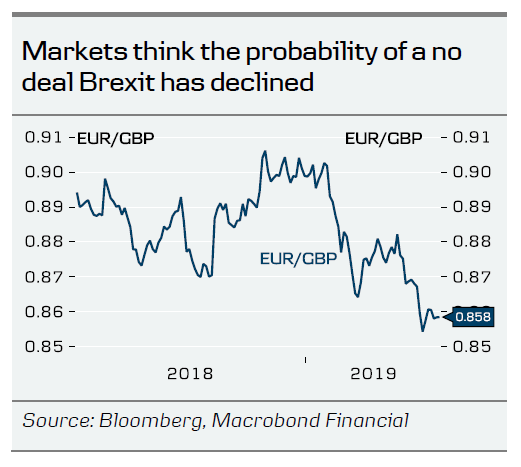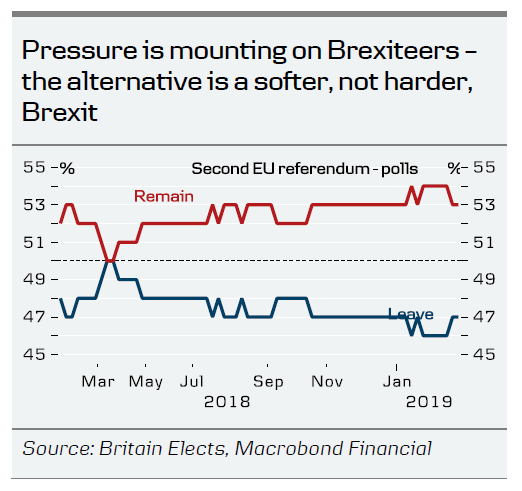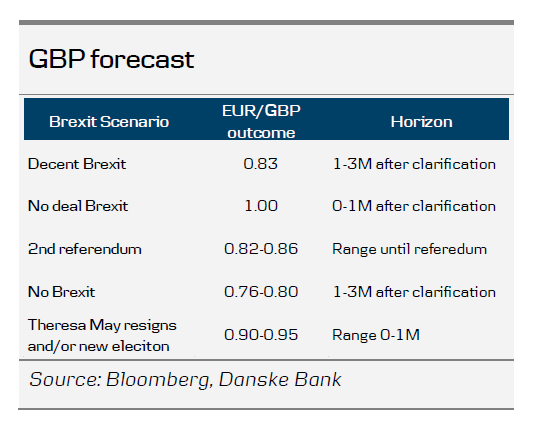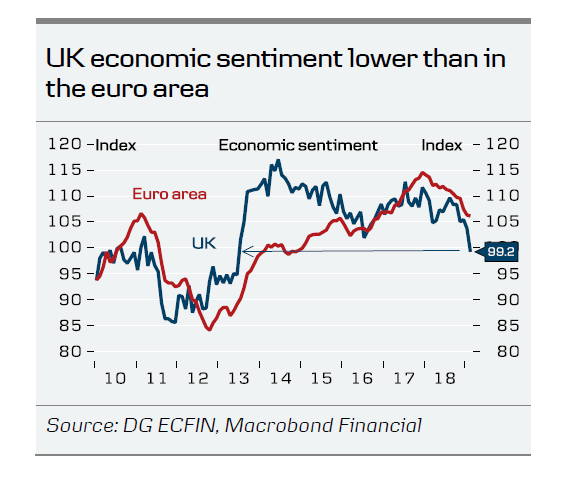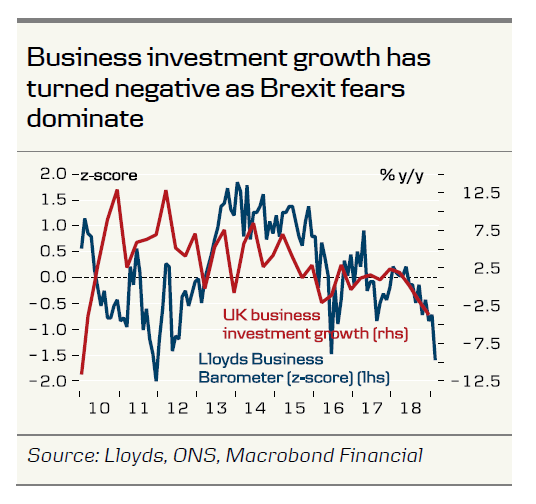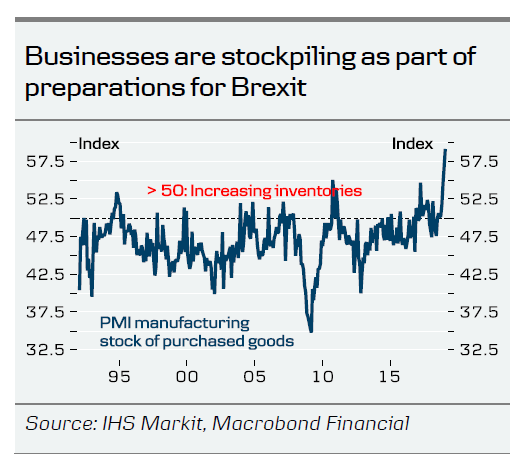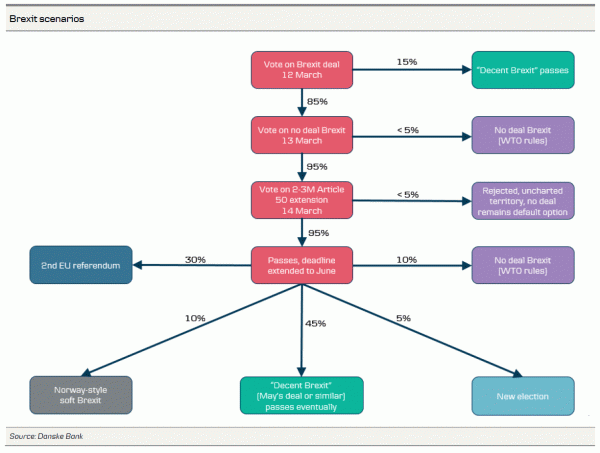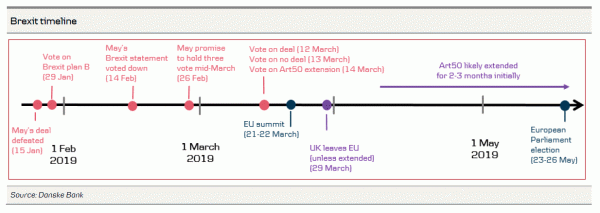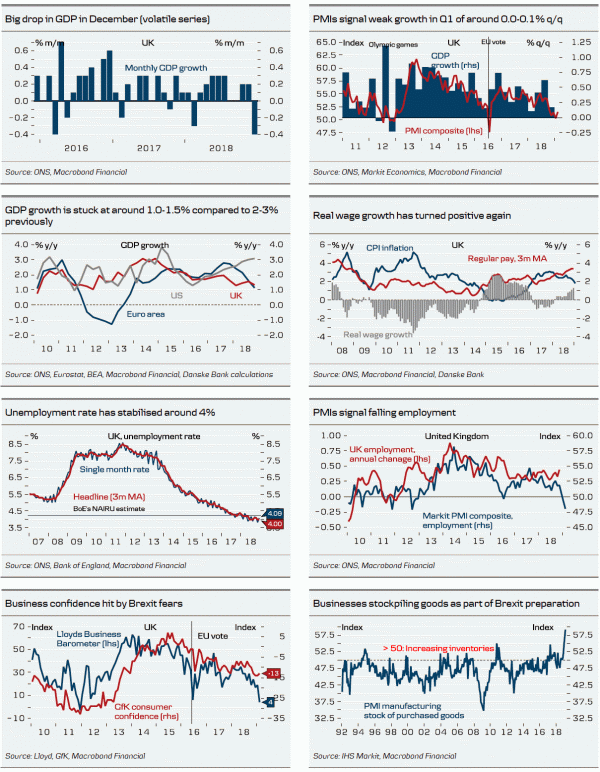We think the probability of Prime Minister May’s deal passing on 12 March is low (15%), although we have seen some softening lately in the Brexiteers’ position on the backstop. The defeat, however, may be smaller than in January and media report that May is already planning a third attempt as soon as 18 March. Some Brexiteers fear voting May down will result in a softer, not a cleaner/harder, Brexit. So far the DUP has not jumped on board, which, in our view, would be a big game changer (as many Brexiteers would likely follow suit). If the deal passes, the EU27 can sign it off at the EU summit on 21-22 March, but the UK would probably still need a short extension in order to pass the necessary secondary legislation. If, against our expectation, the deal is passed, we expect EUR/GBP to move down to 0.83.
We think the probability of the House of Commons voting in favour of a ‘no deal’ scenario on Wednesday 13 March is very slim, likely 5%. This, however, is not the same as the final outcome will be no deal. Some politicians think this step is necessary to keep the pressure on the EU27. Still, this scenario would be GBP negative and we think EUR/GBP will move back to the old 0.87-0.90 range. Eventually, if the UK crashes out without a deal, we expect EUR/GBP to move towards parity, at 1.00.
Our base case is that the House of Commons will vote in favour of asking the EU27 for an extension of Article 50 (95% probability) on Thursday 14 March. It is still up to the EU27 leaders to unanimously accept the proposal and the leaders are divided on whether to accept an extension, and if so, how long it should be. While Tusk is in favour of a very long extension, France’s President Macron does not sound like he would support an extension unconditionally. As an extension seems to be priced in already, we think the potential for another move lower in EUR/GBP is limited. From a technical perspective, there also seems to be considerable support around the 0.85 mark. We expect EUR/GBP to move a bit lower towards, but not below, the 0.85 mark.
In the event of an extension, the battles are just postponed by two or three months and it is not a given that things would change dramatically from here, at least not in the very near term. This means that EUR/GBP would stay around the current level and we may even see a slightly higher spot level, as we cannot rule out markets starting to worry about a no deal outcome again (and UK macro data will likely remain weak, see next page).
Some still need to compromise and change their views eventually – who blinks first, the moderates or the Brexiteers? We think it is going to be the Brexiteers, which is why we stick to our long-held view that May’s deal will pass eventually. When we get Brexit clarification, we foresee EUR/GBP moving down to 0.83. In the event the UK needs to extend further when we reach May, we think the EU will be reluctant to agree unless the extension is very long, possibly until year-end 2020.
Alternatively, we expect the moderate MPs from different parties could combine, forcing May to call for a second EU referendum. This would also lead to a stronger GBP, as polls show a small, but not insignificant, lead for remain.
Macro outlook: Businesses hit by Brexit fears
As we are so close to the Brexit deadline, we think it is a good time to take the temperature of the UK economy. In 2018, the UK economy grew by 1.4% y/y, the lowest growth rate since 2009 when the economy was in recession. The UK economy is no longer one of the fastest-growing G7 economies. Signs in early 2019 are not encouraging either, with PMIs suggesting growth of around 0.0-0.1% q/q. While the overall slowdown in Europe explains some of this, it definitely does not explain all. It is very clear Brexit uncertainties are weighing on the economy (particularly on companies). Notably, the UK economic sentiment index is below the equivalent index in the euro area and is at the lowest level since 2013.
Looking at UK businesses, Lloyds’ Business Barometer (confidence indicator) fell in 2018 and in February it declined further. Businesses are craving Brexit clarity but with only three weeks until the UK formally leaves the EU, we have none. Brexit uncertainty is the main reason why business investment declined in every quarter of 2018. It is the first time since the crisis business investment has declined for four consecutive quarters (although definitely not at the same magnitude as then). Investment indicators for Q1 19 are not encouraging either. While an extension of Article 50 is positive, as it would avoid the UK crashing out of the EU without a deal, it is not perfect. The period of high uncertainty would be prolonged and what would change in three months? Even if a Brexit deal is approved, we do not have full details on the future relationship, which is up for negotiation over the next 2-4 years. This also means that while investment growth will likely turn positive again, many long-term investment projects are likely to be postponed.
Another indication of how UK companies are hit by Brexit uncertainty is inventories. Business surveys such as PMI and the CBI indicators suggest businesses have activated their contingency plans and are stockpiling goods ahead of Brexit. While investors perceive the probability of a no deal Brexit has declined, companies are preparing for the worst but hope for the best. Responsible companies have to ensure they are able to operate in any circumstances, including a no deal Brexit, despite most observers thinking a deal will pass eventually. This limits the potential for higher growth in Q2 and Q3.
Consumers are not feeling as anxious as businesses. Private consumption is growing at around 2% y/y, which, however, is slower than before the EU referendum. One reason for slower consumption growth is that the big drop in GBP led to negative real wage growth, limiting the potential for consumption growth. That said, everything is not rosy for consumers either. The Brits are the most pessimistic on the economic outlook for the next 12 month in the EU28 and overall consumer confidence has declined gradually since the EU referendum. It is also a concern that the latest PMIs suggest companies are reducing, not increasing, the number of employees, as the employment subindex is below 50. This is usually associated with negative employment growth. Employment growth has been quite robust since the referendum but if the new signal becomes reality, it may trigger an outright downturn in the UK.
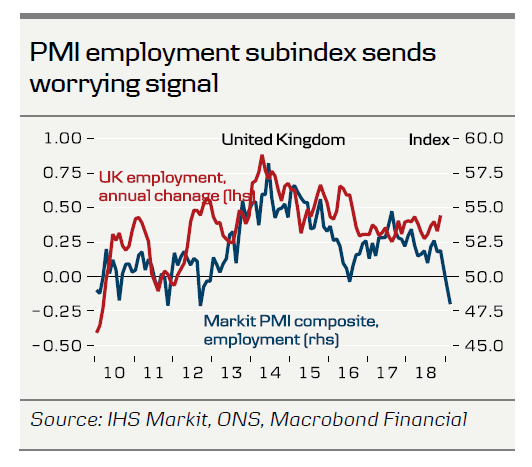 Based on incoming data, we have updated our GDP forecasts for the UK economy, which we now see at just 1% this year, increasing to 1.3% next year (previously 1.2% and 1.4%, respectively). With the ECB on hold over the next 12 months, our case for a Bank of England rate hike in November is also under pressure.
Based on incoming data, we have updated our GDP forecasts for the UK economy, which we now see at just 1% this year, increasing to 1.3% next year (previously 1.2% and 1.4%, respectively). With the ECB on hold over the next 12 months, our case for a Bank of England rate hike in November is also under pressure.

